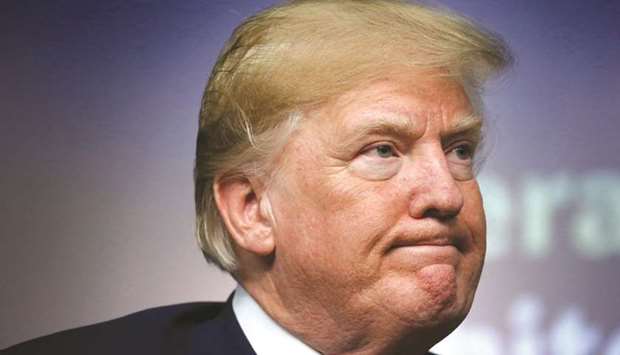US President Donald Trump is expected to announce Tuesday whether he will scrap a 2015 nuclear deal designed to put limits on Iran's nuclear programmes.
France, Germany and Britain have launched a diplomatic offensive in recent weeks to try to persuade Trump not to scuttle the deal, which aims to prevent Iran from obtaining nuclear weapons. But French President Emmanuel Macron has already said their efforts may have failed.
Even as the clock ticked down, Europe said it remained steadfastly by the Iran deal.
‘We believe that the agreement is working and our commitment to continue with the implementation remains,’ said EU foreign policy spokeswoman Maja Kocijancic, adding that other concerns relating to Iran are being addressed separately.
But hopes were lower in other areas.
Iranian President Hassan Rowhani, who has staked considerable political capital on keeping Iran in the deal, on Tuesday prepared Iranians for the US' possible withdrawal.
Iran had sought a ‘win-win’ situation for all, he said. There may be difficulties early on, but ‘we will overcome them,’ he added Iranian Vice President Eshaq Jahangiri said he worried that hardliners in the country would try to use the collapse of the deal to discredit or even destabilize Rowhani's government.
‘The opposition wants to build up the current crisis with the people to create the impression that the government is no longer in charge of the situation,’ he said, in comments carried by the Isna news agency.
Rowhani has cited the deal as an opportunity for Iran to open up to the West and escape sanctions, but more conservative elements, which control key levers of the government, have responded that the deal puts Iran too close to its old enemy, America.
Trump was to make his announcement at the White House at 2 pm (1800 GMT).
Sealed by Trump's predecessor, president Barack Obama - with the support of China, Russia, Germany, France and Britain - the Joint Comprehensive Plan of Action (JPCOA) eased sanctions on Tehran in exchange for commitments to halt what Western powers feared was a nuclear weapons programme.
Trump said he opposed the agreement during the 2016 presidential campaign and, in office, has repeatedly threatened to pull the US out of the pact, last week calling it a ‘horrible deal.’ Reneging on the deal could open the way for the return of US nuclear sanctions on Iran, which would make it hard for any entity that wants to do business in America to also operate in Iran. Kocijancic said Tuesday the EU is looking at protecting the interests of European businesses, but provided no further detail.
A return to sanctions would weigh most heavily on Iran, though the hardliners who are against the deal have long opposed the agreement because it did not lift other US sanctions on Iran, imposed for Iran's other weapons programmes or overseas activities.
But those Iranians who support the deal note that much of the hardline discontent with the deal stems from the fact that Rowhani has benefited politically from the agreement, with him or his backers winning all elections in the country since 2013.
British Foreign Secretary Boris Johnson said Monday that there was currently no viable alternative to the Iran deal.
‘Plan B does not seem, to me, to be particularly well-developed at this stage,’ he told broadcaster Fox News, said to be one of Trump's favourite channels, prior to a meeting with US Vice President Mike Pence.
If the deal was scrapped, Johnson said, ‘you have to answer the question, 'What next?' What if the Iranians do rush for a nuclear weapon?’

